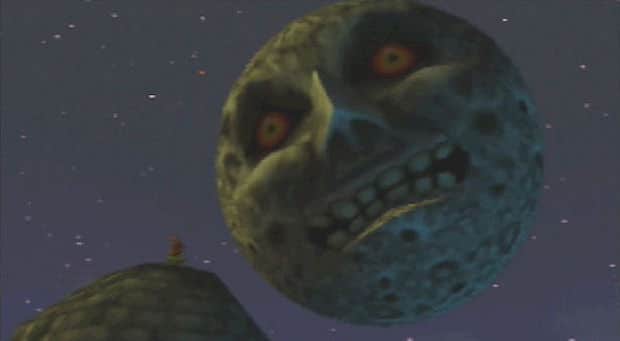Time also flows in many games. Most of the time, this is really just a cosmetic effect. Day and night go by to no real concern of the player. Sometimes, it will have a minor effect on gameplay. This might be that stores are closed at night, and the player will have to wait for day to dawn before they can sell their loot. Designers must always consider time when making a game. Even if there is no passage of time within a game, they must still consider how long the player will spend in the game. At other places, developers may use time as a means to increase the challenge of a particular objective.
Trying to jump across a series of platforms is always more difficult and nerve racking when a clock is ticking at the same time. Just like trying to mail a letter before the post office closes, the threat of the platforms disappearing in ten seconds makes the task harder. Unless you work very well under pressure, it actually can be harder to write that letter the way you want with the timer going. Likewise, adding a timer can make a player rush and cause themselves to fail a simple jumping challenge they would have otherwise made. In this way, one can add difficult to a game, as well as the overall time the player spends playing (since they have to make more attempts).
Sometimes, timers are used as a cheap trick. No game makes a better example of this than Star Fox Adventures. I recently guided a friend through the game and warned him that, "Everything is timed." While this is not entirely true, it is a pretty accurate description of the game. Basically every challenge has a timer linked to it. The few that don't involve precise timing anyway, by say requiring that you quickly turn off a series of fire jets quickly to prevent them destroying a bomb quickly flying past. Quickly, quickly! Time is always against you in this game, and it gets rather grating very quickly. A time challenge here or there is fine, but if the player is constantly pressed they get burned out.
Another side to time in games, is the ability to manipulate it. Unfortunately, time manipulation has become incredibly common place, particularly in first person shooters in the form of bullet time. The ability to slow down time for everyone but you is quite advantageous in such games. However, as I indicated before, it is so common that it fails to interest many players anymore.
But what about the forms that have not become common place? How about rewinding time? Few games have used this ability as well as Prince of Persia Sand of Time. Braid is more recent and also did very well with it, but I am less familiar with Braid, and so I will use Sand of Time. The basis was very simple, here is the story of what I did earlier. Because the entire game is the Prince just recounting the story, he might "goof" in his recollection. While it may be hard to believe his memory is so faulty that he may accidentally claim he was sawed in half, and then quickly correct himself, it is quite handy if you actually are sawed in half. With a simple button press, the prince's body will reconnect and he will leap backwards through the air to land on the platform he fell off of. Then you can try again. And again. And again. While it may seem like this makes the game simple, just keep trying since there's no penalty because you'll eventually make it, the game managed to maintain a good level of challenge throughout. Faulty memory not withstanding.
At this point we come to my favorite time manipulation game, The Legend of Zelda: Majora's Mask. If you are familiar with the game this choice may strike you as odd. If you are not, let me explain why it would be odd. To do this, let me start by setting the scene. Time is always ticking. You have three days to save the world before it is destroyed by the creepy looking moon crashing into it. Time passes at a rate of one second of real time to one minute of game time. This means you have 72 minutes to beat the game. You've also been turned into a Deku Scrub, which really can't do much. In the last moments (the last six hours) you confront Majora's Mask, but are powerless to stop it from calling the moon down on you. You do manage to reacquire your ocarina, which it stole from you, and remember the Song of Time. If you play it, the Goddess of Time will aid, or so you've heard. At that moment, your companion cries out, "Help! Someone, anyone! Goddess of Time! We need more time!" Which is true, so you play the song... and find yourself back at dawn of the first day.
All of a sudden, the time limit becomes less of a problem. You can reset time as often as you need to. You also get the ability to slow time to 1/3 it's normal speed giving you much more time to do things. I said earlier that constant time limits are grating, and while this game is constantly timed, it is mostly a back burner type issue. The interesting thing about the time manipulation, is that you can go forward 12 hours, but you have to reset all the way back to go back in time. Since all the actions of the NPCs are dictated by time, missing an appointment means you will have to reset time in order to catch it on the next set of days. Resetting time has another interesting consequence, all but the most important progress is lost. The bosses must be defeated again, you must introduce yourself to people again, etc.
Majora's Mask is one place where the time manipulation is highly controlled, and has consequences. The Prince of Persia can rewind ten seconds if he misses a jump and try again. But if Link resets time after missing a jump, it's a lot more work to get back to the jump. Also, resetting time is the only way to permanently save the game. I usually don't like games with limited saving, but here I enjoyed it. I like a game that forces you to run a tight ship (but not too tight) and Majora's Mask does just that.
In the end, time manipulation is far from a new concept and perhaps needs to be given time to rest and cool off. Individual timed challenges can be good when well placed, but overusing them as Star Fox Adventures did wears the player out. Majora's Mask's answer of a long overall timer worked for me, but it was one of the main criticisms of the game, alongside being too short. Perhaps the best answer is to take the real world example and let time just go by as normal. Just like it's good for our sanity in real life, it may be best for the player's sanity as well.
There, that is the moon and you have three days to stop it. Go.


I didn't find the Majora's mask reference strange. I was waiting for it from before the beginning, just after I didn't know you were about to start having written.
ReplyDeleteRe jumping around randomly in time, two words: Slaughterhouse Five.
Maybe I'd get all 100 levels of "Find Me" in Wii Play if it didn't have a timer ticking away!
ReplyDelete